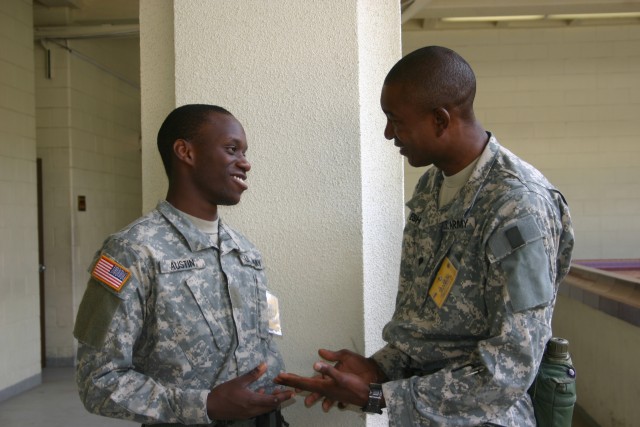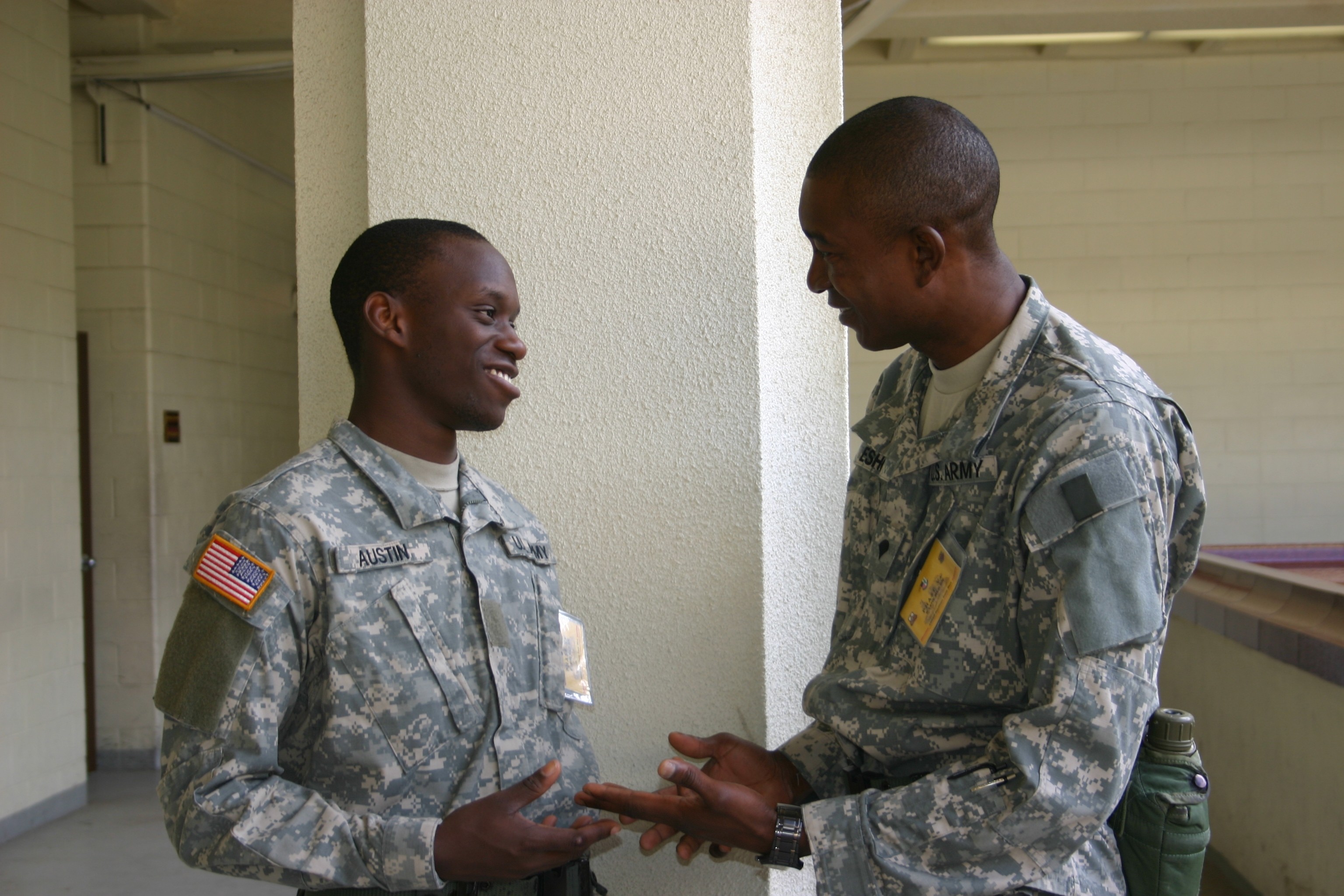FORT SAM HOUSTON, Texas -- Under provisions of the Fiscal Year 2006 National Defense Authorization Act, the Army has raised the enlistment age to 42 for active duty, reservists and Army National Guardsmen.
Raising the maximum age for Army enlistment expands the recruiting pool, provides motivated individuals an opportunity to serve and strengthens the readiness of Army units. Fort Sam Houston is no exception.
One class, 68X Class 02-07, of the Mental Health Specialist Course at the Army Medical Department Center and School, is a perfect example.
"Out of a class of 53 we have what I'd call 10 'old timers,'" said Capt. Darrin Vicsik, the spry 37-year-old commander of B Company, 187th Medical Battalion, "eight of which are proud to say they are over the age of 40 and two are pushing the big 4-0."
Spc. Carol Wright, wife, mother of two and reservist said, "I'm proud of my age. I'm 46 and I don't feel old at all. I was in the service for 10 years back in 1982. I wanted to come back in after I received a recall letter from our president. I wanted to be able to do my part if I could get into this class."
Now a member of the Mental Health Specialist Course, the younger members of the class as well as her other older peers look up to Wright.
"If they can do it why can't younger people like me do it'" said Pvt. Eddy Perez, age 19.
The mental health specialist is primarily responsible - under the supervision of an Army psychiatrist, social worker, psychiatric nurse or psychologist - for providing mental-health treatment to patients. Their duties include collecting and recording psychosocial and physical data; counseling and treating patients with personal, behavioral or mental health problems; assisting with the care and treatment of psychiatric, drug or alcohol patients; providing bedside care in hospitals to include taking the body temperature, pulse and respiration; and giving medication to patients under the direction of physicians and nurses.
Spc. Maria Moton, 42 years old and mother of three sons, joined for what some would say were selfish reasons, but for her, an opportunity to fulfill her dream.
"This was my first time to join. I wanted to join at 18, but had a minor accident and couldn't go as I had planned. When they upped the age, I looked at my job, which was unfulfilling, and decided to do this for me. And though my husband had reservations, my sons told me to go for it, and for once I wanted to do something for me."
From Nigeria, Spc. Sunday Esho moved to the United States seven years ago. He wanted to join the Army in his home country since he was a young boy. However, due to politics and tribal sentiments, he was not chosen to be part of their Army. Disappointed, Esho went on to take up civilian pursuits and earned two bachelor's degrees in accounting and social sciences, and a master's degree in social sciences.
"The group usually makes fun of me, being an older guy, but if I do stuff, they want to do it, and when I run, they want to run too, to try to beat me," said Esho.
Esho's battle buddy, Pvt. Qubia Austin, said, "He's cool. I look to him for advice on everyday stuff. He's good to ask advice."
Spc. Centino Uy, 41, originally from the Philippines, now calls Florida home. Uy left a plumbing job, which he said was boring, and joined the Army to change the direction of his life. With the support of his wife and young daughter he said, "I'm glad I did this. When I go home now, I really appreciate what I have there."
"The studying was very hard to do; I'm in the library all the time. It has been a struggle, but I'll make it. I do feel I have an advantage because we can relate to some of the problems," said Uy. "My roommate comes to me for advice, especially about girlfriends."
Experience has shown that older recruits who can meet the physical demands of Army service generally make excellent Soldiers. They have a maturity, motivation, loyalty and patriotism that bring a wealth of skills and experience to the Army, according to the U.S. Army Recruiting Command. Applicants must meet eligibility standards, to include passing the physical standards and medical examinations.
Another "old timer," Spc. Jerome Schmidt, 43 years old, was a stay at home dad for six years and holds a degree in psychology, having had a practice for years. Since his children did not need him around the house quite as much and since he had the education and experience in mental health, he felt he could be a good example.
"I hope I am setting a good example for people when they see how I carry myself, The PT stinks, because they don't divide us; we do it with the 20-year-olds," said Schmidt. "My wife supports me with this and she rocks!"
Not the last, but the oldest, is Spc. Jeanette Cathy. At 47 years old, Cathy rejoined, having spent earlier years in the army.
"The Army is very different today. It has to appeal to a different generation. It allows Soldiers to retain individuality yet conform to rules and regulations," said Cathy. "Being the oldest doesn't make me feel old, I never want to feel old."
Cathy also left a great job to serve her country. As a civil service employee, Cathy worked with adults with disabilities. She feels she sometimes has an advantage over her younger classmates due to having the life experiences.
"But they have the advantage of being more open minded, more subjective and definitely they have an advantage over me in the physical part. I thought I was pretty fit, but I have had the aching muscles and joints, but I'm doing better and I feel better," said Cathy.
Their peers may call them "old timers," but for the "senior" Soldiers in the Mental Health Specialist Course, age isn't a number, it's a state of mind.


Social Sharing